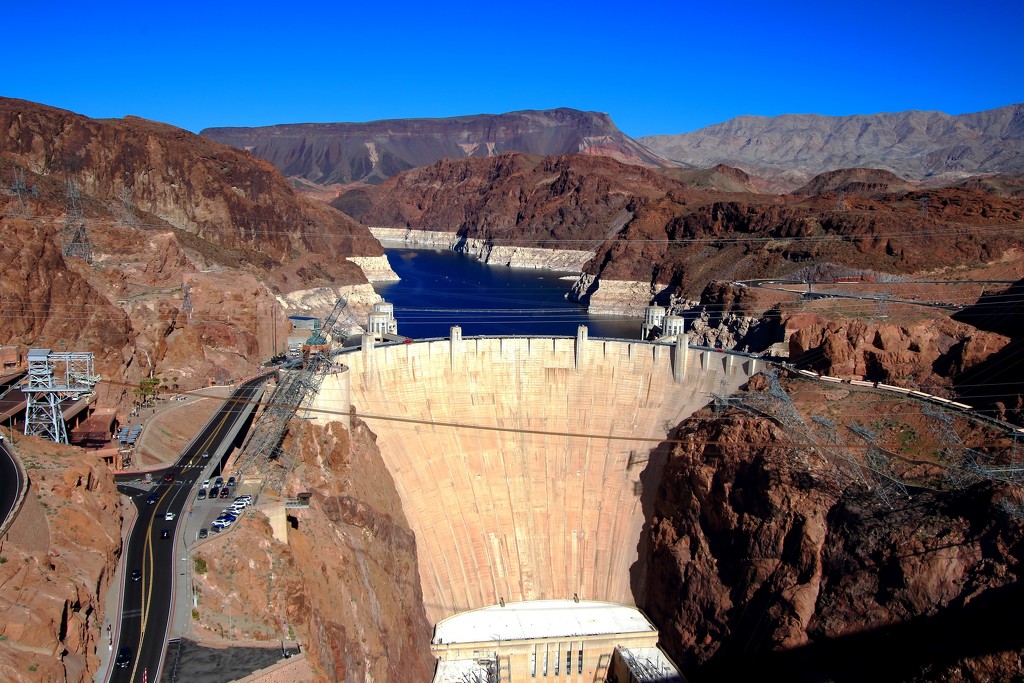Above is a photo that I took of Hoover Dam in January 2020. The water level was precariously low then, and it’s even lower now. About 25 million people depend on the water provided by America’s largest reservoir, but a prolonged drought is slowly sucking the life out of a sustainable future. Living in the American Southwest was always tenuous at best, but as a resident of Arizona, I am wondering if I should stay. When I read such statistics as “the reservoir is only at 36 percent capacity” or that it “dropped to its lowest level in history” it makes me wonder how low the water can go before it crosses a tipping point and starts to evaporate away.
I drove up to Hoover Dam because I wanted to see with my very own eyes what the here and now honestly looks like, and the present moment looks very much like this:



And it’s not just the reservoir that is running out of water, but aquifers and rivers are slowly ebbing away. Every day, I read at least an article or two about the precariousness of the situation across the American West. Here is just but a small sampling of the types of stories that I read all the freaking time: (click on the links to open the articles. I suggest reading at least one. Reading two is better. Reading them all provides the scope of the reality.)
The American West is Drying Out
Arizona’s aquifers remain at risk from ‘unsustainable’ pumping
‘Our own survival is at stake’: Arizona is using up its groundwater, researchers warn
Ammon Bundy And Co. Are Eyeing Another Standoff With Feds In Southern Oregon
Drought Indicators in Western U.S. Flash Warnings of the ‘Big One’
Farmers, regulators and politicians facing the consequences of historic water shortages
The Drought In The Western U.S. Is Getting Bad. Climate Change Is Making It Worse
Shall I go on? Because I could. There is no shortage of articles such as those. The gloom and doom is very real, and I’d be lying if I didn’t say that it frightens me. The West is where I live. I have called it home for the last 27 years. But now I am wondering if I should leave before the lack of water makes that decision for me. But I don’t want to leave. Here is where I want to stay. So, I ask the question: what does the water future here look like?
The short answer is that no one is really sure. Answers range from creating a “so-called Third Straw that would be drilled at the very bottom of Lake Mead to function like a bathtub drain” to reclaiming water (like El Paso already does) to creating more desalination plants to importing water.
All of these solutions, of course, cost money, and they all have their drawbacks. For now, the best we can do is focus on conserving the water we have, but there needs to be an incentive for people to do that. The cost of using water is way too cheap in America, and that (unpopular opinion warning) needs to change. Money talks and people listen. It needs to cost too much to water the lawn. No one needs a lawn. A patch of grass, sure, but an entire lawn, no. Lawns need to be reserved for parks. And taking a shower needs to cost more. No one needs to take a long shower. There are a million little ways to conserve water, and we all need to do our part. Here are 25 water conservation ideas to get everyone started.
If people don’t start saving water now, there will be no water for us to save later.
Thanx for reading!

So much to consider. I wonder in which ways technology companies and corporate farms can reduce their water use in the Southwest.
LikeLike
Educating people like you do is important imho. To many people still think that climate change is not real or something we can’t do anything about. Practical solution like you suggest are a good start and easy to do in your own household, and maybe your garden can represent the climate and surrounding nature you live in and not use the “possibility” of a lush garden in a dry climate. Keep up the good work.
LikeLike